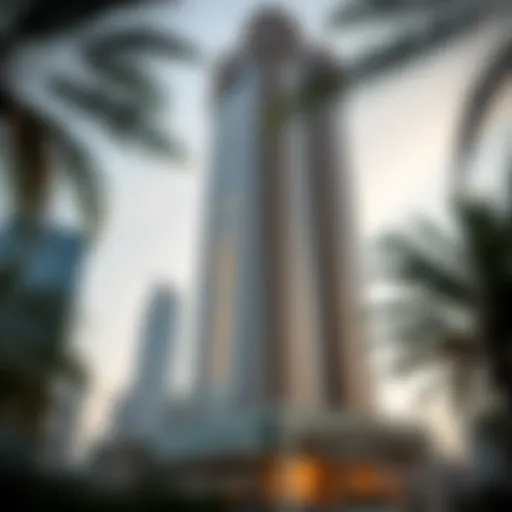Leading Real Estate Firms Driving Dubai's Market


Intro
The real estate sector in Dubai stands as a testament to the city’s ambitious spirit and rapid evolution. With skyscrapers piercing the clouds and sprawling communities rising from the desert sands, the landscape is not just a sight to behold but a symbol of opportunity. Investors, homebuyers, and industry professionals are drawn here, eager to stake their claim in this dynamic market. The vibrancy of this sector is largely defined by pivotal players whose strategies and contributions create ripples throughout the industry.
Market Trends
Current Real Estate Trends in Dubai
The real estate market in Dubai is characterized by its remarkable adaptability and resilience. Recently, the sector has seen a marked shift towards sustainability. Many developers are focusing on eco-friendly designs, integrating smart technologies into their projects, and committing to sustainable building practices. For instance, communities such as Dubai Marina and Jumeirah Beach Residence are not just about luxury but are designed with a focus on environmental sustainability, attracting a new breed of environmentally conscious investors.
Additionally, there’s been a noticeable rise in demand for affordable housing. This shift has “made waves”, as developers are catering to a younger demographic, eyeing budget-friendly options without sacrificing quality. This sector is expected to grow, as many millennials are now looking for investment opportunities in residential properties.
Another significant trend is the rising popularity of off-plan property purchases. Many buyers are seeking the thrill of getting in early on developments, often at lower prices. This has contributed to a steady flow of financial opportunities for both locals and expatriates, steering them towards new developments that promise impressive returns in the future.
Future Forecasts for the Dubai Property Market
Looking ahead, forecasts suggest that the real estate market in Dubai will continue to evolve. Analysts predict a gradual recovery post-pandemic, with moderate price growth driven by continued investor interest and increasing rental yields. The influx of international buyers is likely to persist, bolstered by favorable regulations for foreign ownership and residency. A report by Knight Frank estimates that property prices could rise modestly by 2024, especially in prime locations.
"Dubai continuously redefines its landscape. This city is not just building homes; it's crafting a lifestyle that appeals to a global audience."
Moreover, the upcoming Expo 2025 is set to act as a catalyst for further growth, attracting investments and igniting buyer interest. With a focus on innovation and sustainability, the event will pave the way for new developments and reinforce the city's image as a leading global property market.
Property Types
Residential Properties: Overview and Insights
When discussing residential options, Dubai boasts a wide array of properties, from opulent villas to compact apartments in bustling neighborhoods. Key areas such as Downtown Dubai and Al Barsha see diverse buyer interest, ensuring that there is something for everyone. High-rises with breathtaking views and plush amenities have captured the hearts of expatriate communities, while suburban areas are increasingly favored by families seeking space and tranquility.
Current trends indicate a growing interest in mixed-use developments, where residential, retail, and leisure spaces converge. This approach not only enhances the quality of living but also offers residents everything they need within reach.
Commercial Properties: Opportunities and Challenges
On the commercial front, Dubai continues to be a magnet for businesses seeking prime office spaces. The demand for office space is shifting towards flexible arrangements as companies increasingly embrace hybrid work models. Co-working spaces, in particular, have surged in popularity, catering to startups and freelancers who value versatility.
However, challenges persist, particularly in a post-pandemic world. Economic uncertainties and changing worker preferences pose significant hurdles for office developers. Striking the right balance between location, amenities, and price will be critical for companies looking to make their mark in this competitive sector.
In summary, the real estate scene in Dubai is dynamic and multifaceted. As we analyze the top real estate companies shaping this market, it becomes clear that their innovative strategies and commitment to growth will play a pivotal role in ensuring the city's continued prominence in the global real estate landscape.
Overview of Dubai's Real Estate Market
Dubai's real estate market stands as a beacon of opportunity in the Middle East, attracting both local and international investors. This overview will shine a light on the core aspects driving this vibrant sector. It’s crucial for anyone involved—investors, homeowners, and industry professionals alike—to understand these dynamics to make informed decisions.
Current Market Trends
The real estate sector in Dubai is currently experiencing a robust phase. Property prices have shown resilience even in the face of global economic shifts. For instance, in 2023, the residential property market saw an increase in sales transactions, particularly in luxury segments. The allure of Dubai’s lifestyle and its tax-free environment continues to draw high-net-worth individuals.
Moreover, there’s a noticeable shift towards sustainable developments. Properties equipped with green technology have become increasingly attractive to buyers. This trend emphasizes not just living in luxury but doing so responsibly, a significant factor for today's environmentally-conscious investors.
Some key trends include:
- Increased demand for off-plan properties: Many buyers are now looking for properties yet to be constructed, as they often come with lower prices and more customization options.
- Growth of short-term rentals: Platforms like Airbnb have made short-term rentals a lucrative investment option in Dubai, appealing to investors looking to capitalize on the tourism boom.
Factors Influencing Growth
Several factors intricately weave into the growth narrative of Dubai's real estate market. One significant driver is population growth fueled by expatriate workers seeking opportunities in various sectors. Moreover, the government’s push for mega-projects, from tourism to infrastructure, enhances the city’s appeal.
In addition to this, the oil and gas sector, although fluctuating, contributes significantly to economic stability, thus influencing real estate demand. The continued investments in technology and innovation, especially in sectors like Proptech, have made real estate transactions more efficient, further stimulating growth.
Historical Context
Understanding the roots of Dubai's real estate market provides context to its current state. The market began to evolve significantly in the early 2000s when the UAE government allowed foreign ownership on freehold properties. This transformation encouraged unprecedented foreign investment.
In 2008, the market faced a sharp downturn due to the global financial crisis. However, it bounced back by 2012, with new regulations and infrastructures, such as the opening of the Dubai Metro, helping shape the landscape.
Now, the historical fluctuations highlight resilience and adaptability—characteristics that define Dubai’s ongoing narrative in real estate.
"Dubai's real estate journey has been one of peaks and valleys, but the foundation built today paves the way for sustainable growth tomorrow."


In summary, the overview of Dubai's real estate market illuminates its evolution, current opportunities, and influential factors that continue to motivate growth. This understanding is vital for those looking to navigate this dynamic market.
Leading Real Estate Companies
The landscape of Dubai's real estate market would be unrecognizable without the powerful influence of its leading companies. These firms not only shape the skyline but also guide the market towards sustainable growth, innovation, and investor confidence. Understanding these companies is essential for anyone considering diving into the Dubai property scene, whether it’s for investment or personal purchasing.
Company Profiles
Emaar Properties
Emaar Properties stands tall as one of the giants in Dubai's real estate sector. Known for developing some of the city's most iconic structures, including the Burj Khalifa, its influence is hard to miss. Emaar specializes in large-scale developments and master-planned communities, which are designed to integrate residential, commercial, and leisure spaces seamlessly.
Key Characteristic: The company’s ambitious projects reflect a blend of modern architecture and luxurious living standards. Investors often flock to Emaar because of its lengthy track record of successful completions and high returns on investments.
Unique Feature: What sets Emaar apart is its innovative approach to community living. For instance, their integrated developments often include state-of-the-art amenities, parks, and retail complexes. This unique feature creates a desirable lifestyle for residents and draws in a wealth of potential buyers.
DAMAC Properties
DAMAC Properties has carved its niche in the luxury real estate market. This company is renowned for its extravagant designs and high-end amenities, making it a go-to for affluent buyers. Properties developed by DAMAC are often characterized by their opulent finishing, thematic neighborhoods, and signature touches crafted by world-famous designers.
Key Characteristic: The brand's focus on luxury and lifestyle experiences elevates its standing in the market. DAMAC appeals to investors looking for exclusivity and uniqueness in their property investments.
Unique Feature: A notable feature is the DAMAC Maison branded serviced apartments, offering a unique blend of hotel-like services and home comforts. This appeals significantly to both investors and tenants seeking premium real estate.
Aldar Properties
Based in Abu Dhabi, Aldar Properties also has a significant footprint in the Dubai real estate market. The company is known for developing mixed-use communities and integrated urban schemes. Its projects often focus on sustainability, aiming to make living environments more friendly to both people and the planet.
Key Characteristic: Aldar focuses on creating well-planned communities that combine residential, commercial, and leisure spaces. This holistic approach lays the groundwork for vibrant neighborhoods.
Unique Feature: Their commitment to eco-friendly developments isn't just an afterthought. For instance, the recent projects integrate green spaces and emphasize reduced energy consumption, which distinguishes them from many competitors.
Dubai Properties
Dubai Properties is a flagship development company in the emirate, responsible for iconic projects such as the Jumeirah Beach Residence and Business Bay. Focusing on delivering quality living spaces, the firm caters not only to high-end clients but also to the more budget-conscious buyer looking for value.
Key Characteristic: Their adept understanding of the Dubai market allows them to stay ahead with offerings that reflect current housing trends and buyer preferences.
Unique Feature: What makes Dubai Properties particularly interesting is their focus on community-driven developments. These projects often foster interaction among residents and enhance social bonds, something increasingly valued in today's fast-paced world.
Market Position Analysis
Analyzing the market positions of these leading companies reveals their strategy, execution, and adaptability to changing market conditions. While they all aim for growth, each company approaches the challenges of the market differently, tailoring their strategies to align with niche segments of the industry.
Reputation and Trust
In a high-stakes market like Dubai's real estate, reputation is everything. Buyers often look for companies that have established trust through transparency, quality, and customer service. The leading real estate firms in Dubai not only bring their projects to life but also cultivate relationships with their stakeholders through consistent performance and ethical practices.
“The top companies create a trustworthy ecosystem, which ultimately fosters investor confidence and long-term growth.”
Investment Opportunities
The landscape of Dubai's real estate offers a plethora of investment opportunities that are well worth your attention. Given the city's dynamic economy, strategic location, and booming population, investors are presented with various options ranging from residential properties to commercial holdings. Real estate in Dubai isn't just a means to provide shelter; it's a viable avenue for wealth creation, making it essential to explore the potential investment opportunities in depth.
Investing in Dubai’s property market opens doors to numerous benefits, such as high rental yields and capital appreciation. Investors can capitalize on the ever-increasing demand for properties, driven by both domestic and international buyers.
Key Elements to Consider:
- Market Demand: Assess current housing trends, as certain areas of Dubai show higher demand than others.
- Rental Yields: Many investors are drawn to Dubai for its impressive rental returns, which often exceed those found in other major cities.
- Regulatory Clarity: Recent reforms have made property ownership more favorable, especially for foreign investors. Knowing your legal rights and obligations is crucial.
- Economic Resilience: Dubai's economy, largely fueled by tourism, trade, and finance, continues to strengthen, offering a reliable backdrop for property investments.
Why Invest in Dubai Real Estate?
Dubai’s real estate market is characterized by its innovative spirit and luxurious offerings. The government’s vision for the future includes sustainable living solutions and smart cities, which adds an extra layer of opportunity.
"Investing here is not just about buying property; it’s about becoming a part of a thriving community."
Types of Investment Opportunities:


- Real estate investments can be categorized into several types that cater to varied interests and objectives. Below are three key sectors:
Residential Properties
The residential sector in Dubai stands as a robust investment arena. Demand for homes is consistently high, thanks to the city's growing population and influx of expatriates. Investors can explore various types of residential properties, from affordable apartments to lavish villas.
- Appealing Features: Diverse neighborhoods ranging from family-oriented zones to high-end districts.
- Return on Investment (ROI): Residential investments in sought-after areas can yield significant returns, especially through the rental market.
Commercial Real Estate
Commercial properties in Dubai present an attractive option for those looking to get into the business side of real estate. Office spaces, retail units, and warehouses can generate substantial income, particularly in busy districts like Dubai Marina and Downtown Dubai.
- Considerations: While the ROI can be higher than for residential properties, factors such as location, building amenities, and tenant reliability must be accounted for.
- Growing Demand: As the city continues to attract multinational corporations, there's a consistent need for high-quality commercial spaces.
Luxury Developments
Dubai is renowned for its luxury real estate. Investing in high-end properties can be lucrative, especially in areas frequented by wealthy tourists and affluent residents.
- Unique Offerings: Features such as pioneering architecture, private pools, and exclusive facilities elevate the appeal.
- Market Trends: Understanding the luxury market trends, including buyer preferences—whether it's location, design, or amenities—is key to making informed decisions.
Investors, therefore, have a vast selection at their fingertips. From high-yield residential units to prime commercial spots and extravagant luxury homes, the opportunities are as diverse as the city itself. This comprehensive understanding of investment opportunities is crucial in navigating Dubai’s real estate landscape effectively.
Market Challenges
Navigating the real estate landscape in Dubai is not all sunshine and skyscrapers; there are substantial challenges that stakeholders must face. Understanding these obstacles is crucial for investors and agents alike, as they can heavily impact market dynamics and decision-making. Addressing these challenges head-on equips potential buyers with the knowledge to make informed choices, while also helping companies adapt their strategies for sustainable growth.
Economic Fluctuations
Economic fluctuations are a natural part of any market, and Dubai's real estate sector is no exception. The dependency on global market trends means that properties can soar in value during prosperous times and tumble when downturns hit. Several factors, such as oil prices, tourism influx, and foreign investments play pivotal roles in this fluctuation.
For instance, when oil prices are high, there is typically a boost in investments and spending power, driving up demand for luxury properties. Conversely, economic downturns can lead to a shortage of buyers, causing prices to level off or decrease.
Here are some key points to remember regarding economic fluctuations:
- Investor Sentiment: Prospective buyers may hesitate during uncertain times, leading to decreased demand.
- Price Adjustments: Real estate agents often have to adjust asking prices to attract buyers in a sluggish market.
- Financing Challenges: Fluctuating interest rates may create hurdles for buyers seeking mortgages, affecting their purchasing ability.
Regulatory Hurdles
The regulatory environment in Dubai is complex. Various laws and regulations influence property ownership, especially for foreign investors. While efforts have been made to streamline processes, there remain hurdles that can lead to confusion.
For example, rules on off-plan sales can shift, so developers must ensure compliance with the latest regulations to avoid penalties. Moreover, potential investors often grapple with understanding residency requirements and the associated paperwork.
Being aware of these regulatory hurdles is vital for successful transactions:
- Documentation: It's crucial to ensure all paperwork is in order before committing to any purchase.
- Legal Assistance: Hiring a knowledgeable lawyer familiar with Dubai’s laws can mitigate risks significantly.
- Understanding Rights: Buyers should have clear knowledge of their rights and responsibilities to avoid surprises down the line.
Competition and Market Saturation
With numerous companies vying for attention in the real estate market, competition can become fierce. More players entering the market could mean increased choices for buyers, but it can also lead to saturation, where the supply of properties surpasses demand.
In a saturated market, prices can stabilize or even decline, impacting returns for real estate investors. As properties linger on the market for longer stretches, developers might feel pressured to lower prices or offer incentives to attract buyers.
Here's what to keep in mind about competition and saturation:
- Market Research: It's critical to analyze market trends and identify which areas are thriving versus those struggling.
- Differentiation Strategies: Companies must differentiate themselves from competitors in terms of services offered or unique properties available.
- Adaptation: Innovative marketing strategies can often turn the tide and create unique selling propositions that resonate with buyers.
"Understanding market challenges is the first step in transforming obstacles into opportunities."
As the real estate market in Dubai continues to evolve, addressing these challenges is paramount for anyone involved in the industry. By staying informed and adaptive, investors and homebuyers can better navigate the complexities of Dubai's vibrant property market.
Impact of Technology
The role of technology in Dubai's real estate market cannot be overstated. It has become a cornerstone in shaping the industry, providing tools that enhance efficiency, accessibility, and decision-making. As the market evolves, various technological advancements are being integrated into business models, leading to substantial growth and opportunities for stakeholders.
The integration of technology not only simplifies processes but also attracts potential investors and buyers with the promise of innovative solutions. Real estate companies in Dubai are harnessing these advancements to streamline operations and improve customer experience. Among the key benefits are enhanced data analytics, customer relationship management, and operational efficiency. Keeping up with these trends is essential as they fundamentally change how real estate is bought, sold, and managed.
Digital Transformation


Digital transformation is revolutionizing the way real estate companies operate in Dubai. By adopting new technologies, firms can gather data faster, analyze market trends, and predict customer behavior better. This transformation goes beyond mere digitization; it represents a cultural shift in how businesses think and function.
For instance, firms like Emaar Properties have adopted digital platforms that allow potential buyers to virtually tour properties. This innovation has not only kept the buyers engaged but also expanded the market reach beyond geographical boundaries. Moreover, companies are increasingly implementing cloud technology to facilitate better collaboration among teams, which translates into responsive customer service.
Key components of digital transformation include:
- Automation of processes: Eliminating manual tasks reduces errors and speeds up transactions.
- Data analytics tools: Enabling companies to make informed decisions based on real-time data.
- Customer engagement platforms: Enhancing the relationship with clients through tailored communication.
The future of Dubai’s real estate hinges on the ability to continue embracing and adapting to these digital changes.
Proptech Innovations
The rise of Property Technology, or Proptech, is reshaping the landscape of real estate not just in Dubai, but worldwide. Proptech innovations focus on improving the buying, selling, and management of property through technology. In Dubai, this is particularly relevant given the city’s ambition to be a global hub for innovation.
Various startups and established firms are experimenting with solutions that cater to convenience, transparency, and cost-effectiveness. For example, blockchain technology is being explored for transactions, ensuring a secure and transparent process. Additionally, artificial intelligence applications are increasingly employed for predictive analytics, which helps businesses foresee market trends and adapt their strategies accordingly.
Some notable Proptech innovations include:
- Virtual reality (VR): Offering potential buyers immersive experiences to envision properties.
- Big data: Leveraging information to tailor marketing strategies and specifications to potential buyers.
- Smart building technology: Enhancing property management efficiency and tenant satisfaction.
These innovations represent just the tip of the iceberg. The continuous evolution of technology, combined with a supportive regulatory environment, fosters an ecosystem conducive to emerging solutions that can significantly enhance the real estate market in Dubai.
"Investing in technology is no longer an option; it's a necessity for survival in the competitive real estate landscape."
In summary, technology—through digital transformation and Proptech innovations—is fundamentally altering the real estate paradigm in Dubai. Savvy investors and industry professionals must remain informed about these developments to leverage the technology effectively.
Future Outlook
The future of Dubai's real estate market is a subject of notable interest among investors and stakeholders. As the landscape continues to evolve, understanding the forces that drive growth becomes critical for making informed decisions. This section highlights two primary aspects: predictions for market growth and emerging sustainability trends that are reshaping the sector.
Predictions for Market Growth
Looking ahead, several factors are poised to influence the trajectory of Dubai's real estate market. Analysts commonly highlight the following:
- Continued Demand for Residential Spaces: There's a growing population in Dubai, and with it, the need for housing. The influx of expatriates has created a stable demand that is unlikely to wane in the near future.
- Government Initiatives: Recent policy changes aimed at bolstering foreign investment have encouraged more investors to take the plunge. This is expected to lead to a surge in property development projects across the emirate.
- Event-Driven Growth: Events like Expo 2020—yes, it's been delayed due to the pandemic, but the excitement around it remains—have a positive ripple effect on real estate. Increased tourism and global attention typically translate to rising property values.
Given this mix, many experts predict a steady, albeit cautious, growth rate in the coming years. There’s no denying that Dubai’s real estate market holds its appeal, but potential buyers should keep their eyes peeled for fluctuations that could arise from broader economic trends.
Sustainability Trends
Sustainability isn't just a buzzword anymore—it’s becoming a fundamental component of Dubai's real estate evolution. More developers are now recognizing the importance of eco-friendly practices in attracting buyers. Consider these trends:
- Green Certifications: Properties are increasingly designed to meet sustainability standards, such as LEED certification. This not only appeals to environmentally conscious buyers but often leads to operational cost savings.
- Integration of Smart Technologies: Home automation and energy-efficient systems are gaining traction. Imagine a home that not only saves energy but also enhances comfort and security—it’s what future homeowners are seeking.
- Community-Focused Developments: There’s a shift toward building integrated communities that prioritize outdoor spaces and access to amenities. This trend supports a healthier lifestyle while fostering a sense of community.
"Sustainability in the real estate sector is not just about energy efficiency; it’s about crafting spaces that enhance quality of life while respecting our environment."
As such, developers in Dubai are taking heed, making conscious choices that align with both global standards and local conditions. The focus on sustainability is expected to grow, pushing the market toward innovations that cater to both profit and planet.
By understanding these factors, investors and homebuyers can better position themselves in Dubai’s dynamic landscape, ensuring their decisions align with where the market is headed.
Culmination
The conclusion of this article serves as a pivotal moment to encapsulate the essence of Dubai's vibrant real estate market and the integral role its leading companies play. As we have explored various dimensions, it's clear that the landscape is shaped not just by economic parameters but by strategic visions and innovative practices introduced by top firms. Understanding these elements is crucial for several reasons.
Summary of Key Insights
Over the preceding sections, we have highlighted the multifaceted nature of Dubai's real estate sector. Key insights include:
- Market Growth: The continuously evolving market shows resilience despite global economic fluctuations, driven by factors like tourism, population growth, and foreign investments.
- Company Performance: Leading developers such as Emaar Properties and DAMAC Properties exemplify strong brand reputation coupled with strategic project developments that cater to diverse market segments.
- Investment Potential: Various opportunities across residential and commercial properties indicate not only a robust framework for returns but also a tendency towards luxury and sustainable developments that appeal to foreign investors.
This wealth of information underscores the importance of due diligence, market research, and an understanding of industry trends for prospective buyers and investors. Navigating through this thriving market demands acumen – it’s essential to comprehend what defines a profitable investment in Dubai real estate.
Call to Action for Buyers and Investors
For those looking to make a mark in the Dubai real estate scene, here are steps to consider:
- Research Extensively: Take the time to study the profiles of various companies. Understand their project portfolios, market positioning, and customer satisfaction levels.
- Consult Professionals: Engage with real estate agents and market analysts who can provide localized insights and, importantly, clarify regulatory requirements which may impact investments.
- Observe Trends: Stay informed about current market trends, sustainable developments, and shifts in buyer preferences to better align your investments with future demands.
In the end, the Dubai real estate market is not merely about purchasing properties; it’s about making informed decisions that align with both current market conditions and future aspirations. This article points the way for investors, helping them navigate a complex portfolio of opportunities awaiting in this dynamic city.
"Investment isn't about how much you make, it's about making informed choices to boost long-term wealth and security."
As you delve deeper into the topic, remember that knowledge paired with strategic planning leads to success in the ever-competitive and exciting field of real estate.















